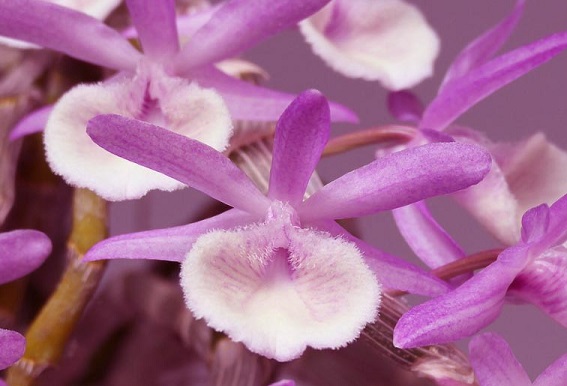Thailand medical researchers discover phytochemicals from orchid roots that can be used to fight diabetes
Nikhil Prasad Fact checked by:Thailand Medical News Team Jul 16, 2024 9 months, 1 week, 2 days, 7 hours, 31 minutes ago
Thailand Medical: Researchers Unveil Diabetes-Fighting Compounds from Thai Orchid. In an exciting new development, scientists have uncovered the diabetes-fighting potential hidden within the roots of the Dendrobium polyanthum orchid. This
Thailand Medical News report delves into the groundbreaking findings that bring hope to millions battling diabetes worldwide.
 Thailand medical researchers discover phytochemicals from roots of the Orchid Dendrobium polyanthum
Thailand medical researchers discover phytochemicals from roots of the Orchid Dendrobium polyanthum
that can be used to fight diabetes
This study was a collaborative effort involving experts from Ramkhamhaeng University, Mahidol University and Kyushu University in Japan.
A Growing Global Health Challenge
Diabetes is a chronic condition that affects millions globally. The disease is characterized by high blood sugar levels, leading to severe complications if not managed properly. Current treatments include various medications, but a definitive cure remains elusive. As diabetes prevalence rises, researchers are increasingly turning to natural remedies to find safer and more accessible treatments.
Orchids: More Than Just Beautiful Flowers
Dendrobium polyanthum, a member of the Orchidaceae family, is native to Southeast Asia. Traditionally, orchids have been used in Chinese medicine for their health benefits. However, this study marks the first investigation into the anti-diabetic properties of compounds found specifically in the roots of D. polyanthum.
Key Findings: Unleashing the Power of Orchid Roots
The researchers isolated eight compounds from the roots of D. polyanthum, including anthraquinones, bibenzyls, phenanthrenes, dihydrophenanthrenes, and flavonoids. Six of these compounds were tested for their ability to inhibit carbohydrate-digesting enzymes and the formation of harmful advanced glycation end products (AGEs).
Moscatin: A Phenanthrene Superstar
Among the compounds, moscatin stood out for its strong ability to inhibit alpha-glucosidase, an enzyme that breaks down carbohydrates into glucose. Moscatin's effectiveness was ten times greater than that of acarbose, a standard diabetes medication.
Moscatilin: A Multi-Tasking Compound
Moscatilin, a bibenzyl compound, demonstrated potent inhibition of both alpha-amylase and AGEs formation. This dual action suggests it could help manage blood sugar levels and reduce diabetes-related complications.
Understanding the Mechanisms: Molecular Docking Analysis
To understand how these compounds interact with enzymes, researchers used molecular docking analysis. This technique predicts how well a compound binds to an enzyme, revealing potential mechanisms of action. The study found that all tested compounds
had lower binding energy values than acarbose, indicating stronger interactions.
Kinetics Study: Non-Competitive Inhibition
Further analysis of moscatin revealed it functions as a non-competitive inhibitor of alpha-glucosidase. This means moscatin binds to a different site on the enzyme than the substrate, offering a unique mechanism to reduce blood sugar levels effectively.
Implications for Diabetes Treatment
The study’s findings highlight the potential of D. polyanthum roots as a source of novel anti-diabetic agents. The isolated compounds, especially moscatin and moscatilin, could pave the way for new, more effective treatments with fewer side effects compared to current medications.
Why Roots? A Sustainable Approach
Utilizing the roots of D. polyanthum for medicinal purposes is not only effective but also sustainable. Roots grow back faster than other plant parts, and their use does not disrupt the plant's photosynthesis process, ensuring the plant can continue to thrive.
The Road Ahead
While the study’s results are promising, further research is needed to ensure the safety and efficacy of these compounds in clinical settings. Comprehensive safety assessments and optimal administration strategies must be developed before these natural compounds can be considered for mainstream diabetes treatment.
Conclusion
The discovery of anti-diabetic compounds in the roots of D. polyanthum offers new hope for managing diabetes. These findings emphasize the importance of exploring traditional medicinal plants for modern therapeutic applications. The study's insights could lead to the development of more effective, natural diabetes treatments, improving the quality of life for millions worldwide.
The study findings were published in the peer-reviewed journal: Heliyon.
https://www.cell.com/heliyon/fulltext/S2405-8440(24)10533-6
For the latest Diabetes News, keep on logging to
Thailand Medical News.
Read Also:
https://www.thailandmedical.news/news/cutting-edge-natural-antidiabetic-compounds-morpholine-piperazine-and-piperidine
https://www.thailandmedical.news/news/honokiol-as-a-natural-alpha-glucosidase-inhibitor-for-diabetes-management
